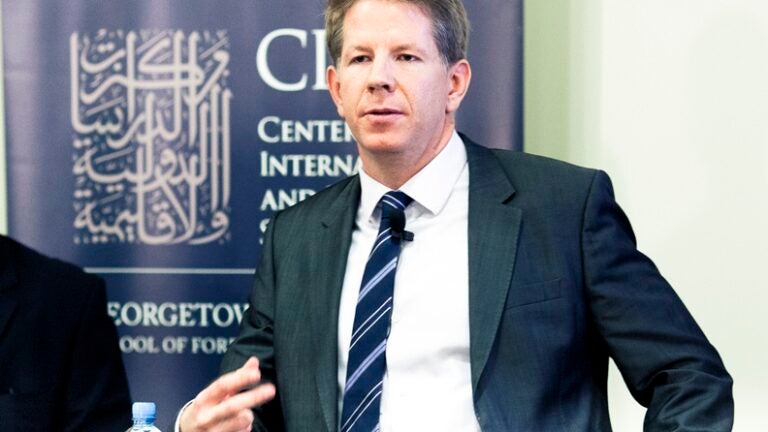American Studies, Dialogue Series, Regional Studies
Frederic Wehrey on Libya's Aftermath and Syria's Future

Frederic Wehrey, senior associate in the Middle East Program at the Carnegie Endowment for International Peace, gave the first CIRS Monthly Dialogue lecture of the 2012-2013 academic year on September 17, 2012. The talk titled, “Analogies at War: Libya’s Aftermath and Syria’s Future,” examined the different approaches that the international community has taken towards the Libyan and Syrian conflicts through the language used to frame the debate. The lessons learned from Libya are often given as examples of how to deal with Syria, regardless of the key differences that exist between the two countries.
Before the actualization of any type of mediation effort, Wehrey explained, analogies and linguistic interpretations of a conflict are employed by administrations and governments to either support or reject intervention. Following the theories of analogy presented by author Yuen Foong Khong in his seminal book Analogies at War: Korea, Munich, Dien Bien Phu, and the Vietnam Decisions of 1965 (Princeton University Press, 1992), Wehrey argued that “not only are analogies used to justify policies, but they actually form part of the psychological and cognitive process that policymakers go through when they embark on decisions.” As such, analogies and the lessons of history figure prominently in foreign policymaking. The US decision to intervene in Libya was itself based on the lessons learned from past conflicts: “the analogy was that Benghazi was not going to be another Srebrenica,” Wehrey argued. Many decision-makers at the White House would have had direct experience of the failures of the international community to prevent the atrocities that took place in Bosnia and Rwanda in the 1990s. This would have prompted current policymakers to use past analogies to justify and build international support for an air campaign over Libya.
Assessing the overall impact of the NATO intervention in Libya, Wehrey recounted that it was a decisive turning point. The international community took multilateral action through consensus and so the intervention in Libya is being held up as a new model for foreign engagement, even being called “the Obama Doctrine,” he said. Moreover, in an era of increasing austerity in the US defense budget following the costly Iraq and Afghanistan wars, “certainly in the US, there is a mystique of airpower because it doesn’t put people at risk and it is relatively low-cost,” when used with precision. “This intervention, which did not cost a single US life, which was successful in toppling a dictator, and which used airpower and very minimal use of ground advisors, is very attractive,” Wehrey said.
This “Libya model” is now being used as an analogy in discussions on how the international community and the United States should approach the conflict situation in Syria. It is important to point out, Wehrey said, that there are a number of limitations in applying this model to the situation in Syria. Unlike the international community’s consensus towards the use of NATO airpower in Libya, there is no such agreement for a coalition operation in Syria. Further, in geographic terms, Syria has no extended coastline from which to guide operations and has high density urban areas making airstrikes a hazard to civilian populations. “The lack of a contiguous rebel-held zone in Syria is impeding our ability to deliver aid, and the lack of an extended coastline that permitted NATO intervention and permitted the rebel logistics to move weapons around and the role of strategic geography is different,” he argued. As such, the Libyan model is not generalizable and cannot be applied to Syria. “We have to take all of these differences into account and be very wary of the misuse of analogies, however appealing they are,” Wehrey explained.
Despite the recent attacks on the US ambassador in Benghazi, Wehrey said that he remains guardedly optimistic about Libya. The country still faces endemic instability as “the people are still digging out of the legacy of forty-two years of brutal Orwellian tyranny that pitted different elements of the society against one another,” he explained. What we are seeing now are “the micro convulsions of a revolution. These are conflicts that are playing out between tribes and between towns, and they are really a testament of how Qaddafi ruled. Despite patronage towards certain tribes, he marginalized others.” Libya has no institutions and, in many ways, this is a blessing as it allows the public to have some say in how these institutions get built from the very beginning. “It is important to remember that the legacy of Libya is still being written,” Wehrey concluded.
Frederic Wehrey’s research focuses on political reform and security issues in the Gulf states, Libya, and U.S. policy in the Middle East more broadly. Prior to joining Carnegie, he was a senior policy analyst at the RAND Corporation where in 2008, he led a RAND strategic advisory team to Baghdad, Iraq, focusing on post-surge challenges in support of Multi-National Forces-Iraq (MNF-I). A graduate of Occidental College, he received an M.A. in Near Eastern studies from Princeton University and a Ph.D. in International Relations from St. Antony’s College, University of Oxford.
Article by Suzi Mirgani, Manager and Editor for CIRS Publications